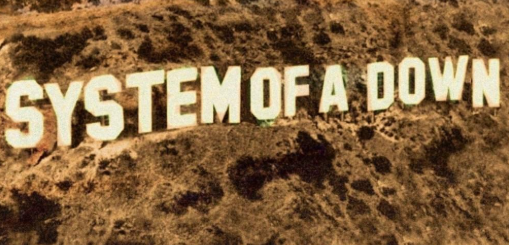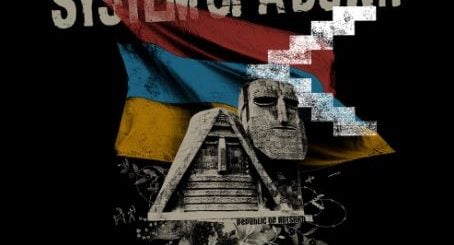Nüguns by System of a Down Lyrics Meaning – The Anatomy of Modern Conflict Through Melodic Unrest
- Music Video
- Lyrics
-
Song Meaning
- Peering Through the Eyes of the Night: The Eternal Witness of Youth
- The Sheets of Denial and The Bullet’s Kiss: A Condemnation of Complicity
- Lovers Connect, Humanity Disconnects: The Stark Dichotomy of War
- The New Guns – Deciphering the Veiled Allegory
- Penance Paid, But To What End? The Song’s Memorable Lines
Lyrics
Into the eyes of the night
Button collects price of his time
Little girl glared
Sheets of denial
Bullet connects to the price of her crime
What have we said
Wasn’t it their bed
What a presence
Haven’t we paid penance
To the new guns
Now the little boy sees
Through the eyes of delight
Levers erect note of his rhyme
Little girl bled
Sheets of the night
The lovers connect to the price of his dime
What have we said
Wasn’t it their bed
What of our presence
Haven’t we paid penance
To the new guns, to the new guns
What have we said
Wasn’t it their bed
What of presence
Haven’t we paid penance
What have we said
Wasn’t it their bed
What of presence
Haven’t we paid penance
To the new guns
To the new guns, to the new
Plunging into the depths of System of a Down’s (SOAD) ‘Nüguns’, one cannot help but be wrapped in the shroud of allegory and sharp social commentary that is characteristic of the band’s oeuvre. The song, a lesser-known yet hard-hitting track from their 2002 album ‘Steal This Album!’, is a pronounced critique of the inexorable cycle of violence and the shadow it casts upon innocence and society.
Exploring the themes of ‘Nüguns’, listeners are subjected to a barrage of conflicting emotions, a carefully orchestrated cacophony by SOAD that serves as a mirror to the tumultuous nature of the issues they tackle. With a penchant for poetically dissecting the grotesque visage of war and its broader implications, the band renders a ballad of the bleakest realities, woven through with a thread of resilience and biting insight.
Peering Through the Eyes of the Night: The Eternal Witness of Youth
The song opens with a jarring contrast – a child peering into the fathomless ‘eyes of the night’, a metaphor for the unknown and perhaps the harsh truths of the world they’ve yet to comprehend. There’s a haunting innocence betrayed by the ‘price of his time’ and the ‘little girl glared, sheets of denial’, encapsulating the scars inflicted upon the young by conflicts they had no hand in creating.
The notion of innocence pays dearly in a society overrun by the metaphorical ‘new guns’—new powers, new conflicts, and the ceaseless progression of militarization. The imagery serves to admonish not only the physical acts of violence but the psychological impact on youth, indicated by the ‘little girl bled, sheets of the night’, suggesting a loss of innocence too profound for mere tears.
The Sheets of Denial and The Bullet’s Kiss: A Condemnation of Complicity
System of a Down seldom minces words, and in ‘Nüguns’, this directness pierces through as they challenge the listener’s consciousness with ‘bullet connects to the price of her crime’. The ‘sheets of denial’ almost certainly refers to the willful ignorance or the attempts to cover up the atrocities that are part and parcel of warmongering and violence.
The ‘crime’ here could be a metaphor for the collective guilt society bears for allowing the perpetuation of violence at the hands of the ‘new guns’. The culpability shared by the populace insinuated through these lines forces a contemplative dialogue on the listener’s part: to what extent does inaction or unawareness partake in the continuum of conflict?
Lovers Connect, Humanity Disconnects: The Stark Dichotomy of War
As the lyrics progress, the ‘lovers connect to the price of his dime’ serves as a powerful juxtaposition. Love, a universally cherished emotion, is here tainted with transaction —perhaps implying that in the grand scale of conflict, even the purest human connections are not immune to the dehumanization that comes with war’s commodification.
The ‘dime’ then may represent the minimal value placed on human life or affection amidst conflict scenarios, where every decision is costed and tabulated with chilling indifference. These lines lead us into a deeper melancholy, contemplating the stripping away of soul wrought by the clangor of warfare.
The New Guns – Deciphering the Veiled Allegory
Central to the song, ‘the new guns’ reverberates as more than just high-powered weaponry. They become a symbol for contemporary mechanisms of control, oppression, and the ill-fated allure for change through firepower. This recurring lyric underlies the vicious cycle that newer forms of dominance and destruction are birthed from the remains of the old.
The ‘new guns’ phrase anchors the song in a kind of historical nihilism. The relentless rhythm in which it’s presented to the listener suggests a never-ending cycle, as if to say, with the advent of each ‘new’ era or technological advancement, humanity is doomed to repeat its most primal failings – violence and subjugation.
Penance Paid, But To What End? The Song’s Memorable Lines
The interrogative repetition of ‘What have we said/Wasn’t it their bed/What of presence/Haven’t we paid penance’, strikes a chord as one of the song’s most memorable moments. It invites interpretation—questions what has been sacrificed, what presence has been lost, and whether society has indeed ‘paid penance’ for the sins of violence.
These lines resonate with the underlying acknowledgment of humanity’s shared responsibility for the world we’ve created. The idea of ‘penance’—a word steeped in the concepts of remorse and reparative action—rings hollow in the face of the ‘new guns’, implying a continuous struggle for the realization of peace and the societal rebirth that must follow.








